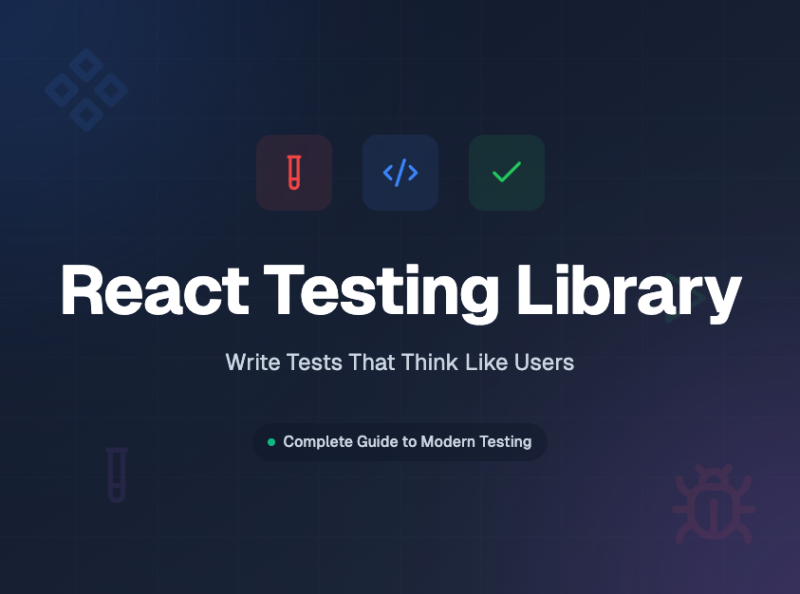Introduction
React testing has evolved significantly in recent years, with React Testing Library emerging as a leading solution for creating reliable, maintainable test suites. As organizations increasingly prioritize robust testing strategies, understanding the landscape of React testing libraries and frameworks has become crucial for modern web development.
GitNation brings together leading experts in React testing, including Josh Justice, a veteran developer who specializes in React testing optimization, Bonnie Schulkin, who brings 18 years of software industry experience with a focus on test-driven development, and Murat K Ozcan, a Staff Engineer & Test Architect with extensive experience in testing frameworks. Their collective insights provide a comprehensive view of current best practices and emerging trends in React testing.
This guide explores the complete ecosystem of React testing libraries, focusing on practical implementation strategies and real-world solutions. Whether you're transitioning from Enzyme, evaluating Cypress Component Testing, or looking to optimize your existing React Testing Library implementation, you'll find actionable insights drawn from our experts' deep experience and successful implementations.
Core Testing Libraries and Frameworks
React Testing Library: The Modern Standard
React Testing Library has revolutionized how developers approach component testing, emphasizing user behavior over implementation details. As Josh Justice explains in his comprehensive workshop on React Testing Library, this approach leads to more maintainable and reliable tests:
"React Testing Library answers many crucial testing questions, allowing developers to focus on what matters: testing behavior that users care about rather than implementation details that may change."
The library's focus on accessibility and user interaction patterns has made it the preferred choice for teams building production-grade React applications.
Reference: Designing Effective Tests with React Testing Library - talk by Josh Justice from React Day Berlin 2022.
Transitioning from Enzyme
While many teams still maintain Enzyme-based test suites, there's a clear industry trend toward React Testing Library. Bonnie Schulkin's journey from Enzyme to React Testing Library offers valuable insights into this transition:
"Testing Library's opinionated framework enforces best testing practices, encourages accessibility, and leads to simpler, more readable tests. The shift has fundamentally improved how we approach component testing."
Her experience highlights the key advantages of modern testing approaches, including improved test stability and reduced maintenance overhead.
Reference: Testing React: A Convert’s Journey from Enzyme to Testing Library - talk by Bonnie Schulkin from TestJS summit January 2021
Cypress Component Testing: A Powerful Alternative
Cypress Component Testing offers unique advantages for teams seeking real browser-based testing solutions. Murat K Ozcan's detailed comparison between Cypress and React Testing Library reveals important considerations:
"Cypress Component Testing provides superior developer experience and observability, offering unique advantages for complex components and stable testing in CI environments."
His analysis helps teams make informed decisions about their testing infrastructure, particularly for projects requiring sophisticated interaction testing.
Reference: Cypress vs Jest: Testing Insights - talk by Murat K Ozcan from TestJS Summit 2023
Best Practices and Implementation Strategies
Test-Driven Development with React
Josh Justice emphasizes the importance of test-driven development in React applications:
"TDD helps you see how to test each bit of logic, whether to mock dependencies and improves the overall design of your components."
Key TDD principles for React applications include:
- Writing tests before implementation
- Focusing on component behavior
- Maintaining test isolation
- Using realistic user interactions
Reference: Designing Effective Tests with React Testing Library - talk by Josh Justice from React Day Berlin 2022.
Component Testing Strategies
Drawing from multiple expert perspectives, successful component testing requires:
Behavior-Focused Testing
- Test user interactions rather than implementation
- Focus on accessibility and screen reader compatibility
- Verify expected outcomes from a user's perspective
Effective Test Organization
- Group related tests logically
- Maintain clear test descriptions
- Follow consistent naming conventions
Mocking and Integration
- Use appropriate mocking strategies
- Test external integrations effectively
- Handle asynchronous operations properly
Handling Asynchronous Operations
Testing asynchronous operations requires special consideration. Murat K Ozcan provides valuable insights into handling async testing challenges:
"The key to stable async tests is understanding the different approaches available in each testing framework and choosing the right tool for your specific needs."
Reference: Cypress vs Jest: Testing Insights - talk by Murat K Ozcan from TestJS Summit 2023
Advanced Testing Considerations
Accessibility Testing
React Testing Library's emphasis on accessibility has transformed how teams approach component testing. Bonnie Schulkin notes:
"The focus on accessibility queries has not only improved our tests but has made our components more accessible by default."
Key accessibility testing principles include:
- Using semantic HTML elements
- Testing with screen reader considerations
- Verifying ARIA attributes and roles
Reference: Testing React: A Convert’s Journey from Enzyme to Testing Library - talk by Bonnie Schulkin at TestJS Summit 2021
Performance Testing and Optimization
Performance testing considerations include:
- Component render optimization
- State management efficiency
- Network request handling
- Animation performance
Conclusion
The landscape of React testing continues to evolve, with React Testing Library, Cypress Component Testing, and other frameworks providing robust solutions for different testing needs. Through the insights shared by our expert speakers at GitNation conferences, we've explored comprehensive strategies for implementing effective testing practices.
For deeper insights into specific testing approaches and advanced implementations, we encourage you to explore the full talks referenced throughout this guide. Each presentation offers detailed examples, practical demonstrations, and expert guidance to help you build more reliable and maintainable React applications.
Continue your React testing journey by watching our expert talks:
- Josh Justice's comprehensive guide to React Testing Library - workshop at React Advanced 2022
- Bonnie Schulkin's insights on transitioning from Enzyme - talk at TestJS Summit 2021
- Murat K Ozcan's detailed comparison of testing frameworks - talk at TestJS Summit 2023
These resources provide the detailed knowledge and practical examples you need to implement effective testing strategies in your React applications.
















